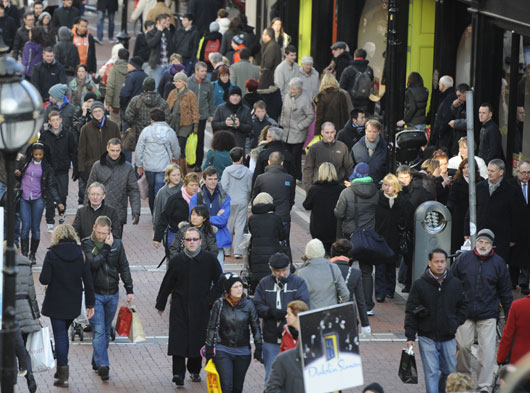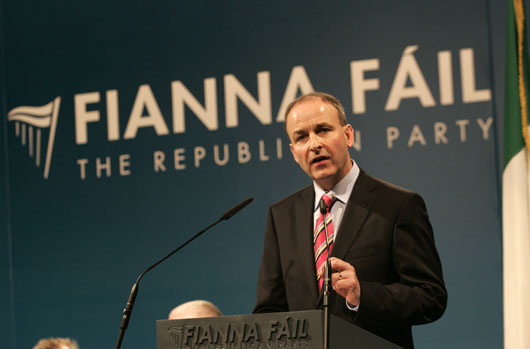2 April 2012
Fianna Fáil fail the people yet again

What neither Stephen Collins nor Fianna Fáil realise is that the bottom line is the restoration of national sovereignty, the removal of all political power and influence from the moneyed classes, and a renunciation of the corrupt ways of the past
FIANNA FÁIL’S ard fheis last month confirmed the view of many commentators that the party has found no way out of the crisis brought on by the economic catastrophe inflicted by the previous government on the Irish people – a crisis revealed in Fianna Fáil’s general election drubbing.
When the party began to disintegrate just prior to the election, new leader Mícheál Martin stressed that the only way to recovery for the party was to go back to its basics and rediscover the radical purpose of its foundation.
Martin’s speeches seemed to indicate that he had learned the lesson of the party getting caught in the pockets of builders and bankers, and that he stood for a new direction.
Worth remembering is that Éamon Ó Cuív also campaigned for the party leadership on a platform of getting back to the party’s radical roots and reconnecting with the masses of working people, in rural and urban Ireland, who had over the decades provided the core of its support.
More about Ó Cuív later but Martin’s leadership promise quickly wilted before the reality of the Young Guard who survived the electoral debacle. The choice of Michael McGrath as spokesperson on finance illustrated this most clearly because McGrath has consistently decried any proposal to tax the rich to provide the stimulus incentive to get out of economic recession on the basis that the rich will leave the country if they’re taxed.
He ignores the fact that the poor – including the sons and daughters even of middle-class families – are leaving the country precisely because we don’t tax the rich!
Well, at least we know where McGrath stands, and since Martin appointed him to this position we have a good idea of the reality that lies behind Martin’s revolutionary rhetoric.
Thus the ard fheis was heavy on hope for the rebuilding of the party but very thin on the ground as to how to do it.
The most humiliating aspect was surely the sycophantic way the audience tittered as Colm McCarthy condescendingly spoke down to them, explaining as one would to a wayward child why there could be no sweets. If there were any glimmer of revolutionary reconstruction in the party, surely some voice in the audience would have denounced the author of the Bord Snip attack on public service and rural Ireland.
No such voice was raised.
Fianna Fáil clearly do not understand what happened to them. For years they could rely on majority support among urban workers and rural smallholders, added to a pragmatic backing from elements of the middle class who saw the party as a competent and able manager of the economy.
That claim to competence is now in tatters, while the urban working class are massively alienated because the party’s links to wealth proved more important that their sympathy for the workers. But not one voice was raised at the ard fheis to point this out, or to underline the danger this poses to the party’s hopes of recovery.
More telling even was the debate – if it can be called that – on the European Union.
While Fianna Fáil rightly demanded that the fiscal treaty be submitted to the people in a referendum, when push came to shove the party rallied to put the interests of European bankers ahead of the Irish people: it is calling for a ‘Yes’ vote to a treaty that will make permanent the loss of economic sovereignty and that will subordinate the interests of the Irish people to generate jobs to Europe’s desire to feather the bankers’ nests.
In other words, when faced with a real issue and a real choice, Martin fell back not on the radical roots of Fianna Fáil at its foundation but on the Europhile hysteria that has lined the pockets of so many of the party’s financial backers.
Of course, there was a spectre haunting the ard fheis and that was the challenge implicitly posed by Éamon Ó Cuív. I say ‘implicitly’ because Ó Cuív himself was careful not to put the issue forward in terms of leadership but in terms of a factual debate about the reality of the fiscal compact (austerity) treaty.
This did not save Ó Cuív from the wrath of the diehard euro-fanatics. Noel Whelan, one-time Fianna Fáil candidate, castigated Ó Cuív for “looking backwards not forwards”; Stephen Collins, high political priest of the Irish Times, denounced Ó Cuív as a dangerous element that needed to be “faced down”.
So grave indeed was the threat posed by Ó Cuív that Collins even went as far as to call for the need to save Fianna Fáil so that there could be a “responsible” opposition and that both Sinn Féin and Ó Cuív could be kept at bay.
What was Ó Cuív’s argument then? Well, you won’t know if you read The Irish Times because his Dáil speech on the fiscal treaty was censored from the ‘paper of record’.
What he did say was that in respect of “the remedies being offered to Greece”, for example, “the focus of the European Union, the ECB and the IMF is to try to recover the maximum amount of money for the private investors . . . giving priority to debt repayments over other Government obligations. This bail-out makes debt the number one priority rather than seeking to create a financially secure and socially just Greece.”
Turning to Ireland he said:
“A number of things are needed to resolve our present crisis. These include the need for a sustainable employment and growth package and the recognition that imposing enormous debts on countries arising out of the follies and failures of international banking and finance corporations is neither just nor sustainable.”
And he concluded by saying that if the Dáil is to be relevant “it needs to question objectively and scrutinise every policy proposal” “Ireland must stand up,” he said, “for fair play, equity and natural justice for all the small nations in the European Union as this is the best way to protect our own interests and all those of other vulnerable small nations and ultimately the European Union.”
This, of course, is close to the Sinn Féin position, though Ó Cuív remains much more supportive of the European project – the main difference between him and republicans.
But Ó Cuív’s position is in tune with the radical roots of Fianna Fáil, claiming to speak for ordinary people and not business interests, and asserting the prime necessity of achieving and maintaining sovereignty – all of which are now being abandoned by Mícheál Martin.
This is the context in which the media are now purporting to lay down terms on which Sinn Féin will be allowed access to the big table with Fianna Fáil. Stephen Collins completely ignores the deep and critical analysis of Fianna Fáil that Sinn Fein has put forward and instead has declared that if Sinn Féin accept the Fianna Fáil parameters they can be allowed play.
What neither he nor Fianna Fáil realise is that the bottom line is the restoration of national sovereignty, the removal of all political power and influence from the moneyed classes, and a renunciation of the corrupt ways of the past.
This ard fheis has shown that Fianna Fáil does not yet realise this and carries on the delusion that business as usual will suffice as the current government crumbles under its own contradictions and failures.
No wonder that Sinn Féin is going up in political support while Labour go down and Fianna Fáil stay stuck in the rut.

Fianna Fáil leader Mícheál Martin
Follow us on Facebook
An Phoblacht on Twitter
Uncomfortable Conversations

An initiative for dialogue
for reconciliation
— — — — — — —
Contributions from key figures in the churches, academia and wider civic society as well as senior republican figures





